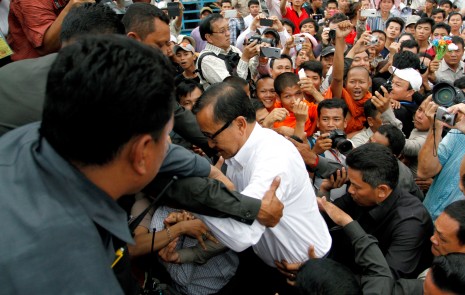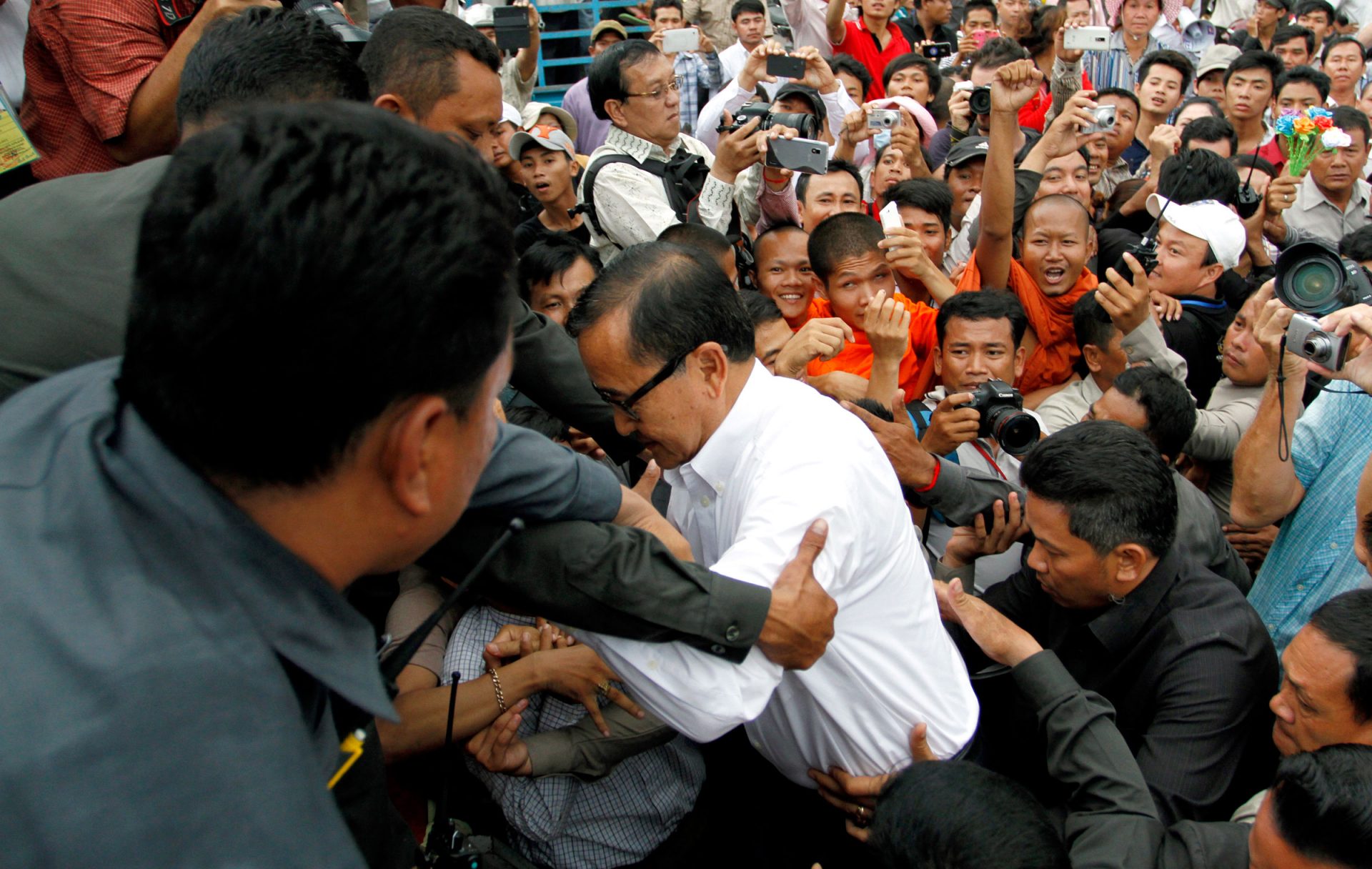When opposition leaders Kem Sokha and Sam Rainsy arrived at Monday’s rally in Phnom Penh, they were escorted out of their SUVs, moved through an emotional crowd and lifted onto the stage by a bevy of burly men dressed in green, gray and beige uniforms.
As the CNRP’s vice president and president addressed well over 10,000 ardent supporters, the heavy—though unarmed—presence of their personal security apparatus was impossible to miss.

Wherever they have gone, whether on the campaign trail or at the rallies that have followed July’s contested national election, Mr. Rainsy and Mr. Sokha have been followed, and often surrounded, by about a dozen bodyguards each.
Though their number and muscular physique do not compare to the posse of bodyguards that follow Prime Minister Hun Sen on his trips around the country, Mr. Rainsy on Tuesday said that the opposition party is not taking security for granted despite the threat of political violence having subsided significantly since Mr. Rainsy was almost murdered during a grenade attack at an opposition rally in 1997, which killed a bodyguard, along with 15 other people.
“I think the CPP has switched to more sophisticated means to eliminate me. Before they sought to eliminate me physically, now it is better in the sense that they just want to eliminate me politically through the judiciary and through indictments in which I am condemned and forced into exile,” he said.
“But as last resort I do not exclude the possibility that because of fears that I can be a very serious threat…they could attempt to eliminate me physically,” he said.
The CNRP security guards, who according to party officials have received training or advice from the Cambodian government and, more recently, the Washington-based International Republican Institute (IRI), work on a largely volunteer basis and, over the past two months, have had little sleep.
“Those people [CNRP security guards] have been with me for a long time,” said Mr. Rainsy.
“When I was Minister of Finance [in 1993 and 1994], it was the CPP who provided me with those bodyguards, and when I left the ministry, those bodyguards were supposed to return to their barracks with the CPP. But some of them asked to stay with me instead of returning to their CPP bosses,” he said.
Asked in July why there was such a visible security presence around Mr. Sokha while he was heading the opposition campaign as its acting president, Mr. Sokha said only: “I think you can figure that out.”
CNRP spokesman Yim Sovann, who has been working in opposition politics for nearly two decades, said that the party allows its veteran security guards to do much of the recruitment of new security personnel for the party’s leaders.
“We rely on the [existing] group, and they invite some friends to help. In the last 20 years, we have not had any problem with security guards,” he said, adding that the CNRP was not concerned about claims that the CPP puts spies in its security ranks.
“The ruling party sends their people to work for the security unit—to put a spy in it. All those spies become our friends now and are the personal bodyguards for Sam Rainsy,” he said.
Long Ry, head of security for the CNRP and an elected member of the National Assembly in Banteay Meanchey province, said that although many of the bodyguards volunteer to protect Mr. Rainsy and Mr. Sokha, the unit had received professional training in protection.
“The IRI sent experts from Washington [in 2008] to help train the bodyguards that protect [Mr. Rainsy] directly. These bodyguards were trained in how to protect him, react in an emergency, drive and prevent attacks,” said Mr. Ry.
“We volunteer for this work because we love democracy,” he said, adding that apart from food and accommodation while on the road, the security guards also received some compensation from CNRP donors abroad.
Jessica Keegan, acting country director of IRI, said that she “was not able to verify” whether or not the IRI was involved in training opposition security guards in the past, but said that the IRI “does not provide security related trainings.”
“That is not something we specialize in. Nothing like that has ever taken place that we have sanctioned, that I know of,” she added.
However, Mr. Rainsy also said that he recalled the IRI’s assistance in training his security force.
“If I remember, security experts were sent by IRI who trained them [SRP security guards], especially in nonviolent demonstrations and nonviolent protection. They were not trained to return fire. It was for protecting ourselves and withdrawing quickly in a safe place and taking precautionary measures,” Mr. Rainsy said.
The IRI also gave more than $400,000 in 2002 to help launch the Cambodian Center for Human Rights, which was headed by Mr. Sokha before he founded the opposition Human Rights Party in 2007.
Mr. Sokha’s current security team, however, was largely inherited from the SRP when the two main opposition parties merged in 2012 to form the CNRP, according to CNRP deputy head of public affairs Kem Monovithya, who is also Mr. Sokha’s daughter.
Kim Chan, the deputy head of security for Mr. Sokha, said that while he has also received some training from “U.S. experts,” most of his experience in providing protection from potential enemies comes from serving as a soldier in the Cambodian military from 1982 to 1998.
“I was trained as a government soldier in the 1980s at a military academy. I learned how to shoot too,” Mr. Chan said.
The dozen or so security guards who are on call at any given time are expected to remain alert, despite only about 4 hours of sleep a night, and are always at Mr. Sokha’s side, according to Mr. Chan.
“Wherever he goes, we are with him. Some of us are guarding the car to make sure it is not touched. The other 12 are driving ahead of us to make sure the road is clear,” he said, adding that the job requires a certain level of discipline.
“I have to have a good physical appearance. I have to be careful with my diet and not drink too much alcohol. I eat a lot of vegetables and only drink once every three or four months,” he said.
Mr. Chan said he was not concerned about the physical dangers that come with the job as he would give his life for the party because he supported their message.
“We are not concerned [about being attacked] since we have the same idea as the [CNRP] president. We want to change the leaders of the country,” he said.




